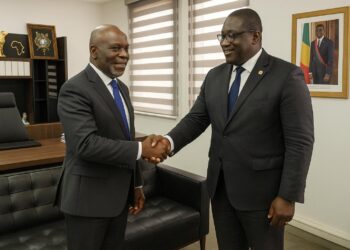Regulatory Pivot in Brazzaville
After three years of persuasion, the Congolese authorities have decided that the velvet glove has served its purpose. On 25 July in Brazzaville, Jean Claude Bazebi, Director-General of the Agency for the Regulation of Fund Transfers (ARTF), informed foreign-owned and domestic remittance firms that the period of gentle reminders is over. The announcement was not mere administrative housekeeping; it marked a strategic pivot in the government’s wider effort to modernise the nation’s financial architecture and align it with evolving regional standards set by CEMAC and the Inter-Governmental Action Group against Money Laundering in Central Africa (GIABA 2024).
Why Remittances Matter to Fiscal Stability
Official data from the World Bank indicate that personal remittances to Congo-Brazzaville have surpassed half a billion dollars in certain recent years, a lifeline for thousands of households and a discreet but meaningful source of foreign currency (World Bank 2023). Yet the same flows, when channelled through unregistered kiosks, slip beneath the statistical radar, distorting the balance of payments and complicating monetary-policy calibration by the regional central bank, BEAC. As one senior Treasury official confided in private, the government can only design credible macroeconomic forecasts ‘if we know what truly crosses our borders, digitally or in cash’. The new enforcement drive therefore aspires to capture granular data while maintaining the fluidity that makes remittances attractive.
Legal Architecture Guiding the Clampdown
The backbone of the current campaign is Article 13 of the amended Finance Law 2025, which obliges every money-transfer operator, however small, to register with ARTF and to transmit monthly transaction reports by the tenth day following each period. Registration is not a symbolic gesture. Firms operating in the shadows risk fines scaling from 20 million to 50 million CFA francs, accompanied by possible closure and criminal prosecution in aggravated cases. The sanctions mirror the graduated penalty framework recommended in the latest IMF Article IV consultation, reflecting a preference for deterrence rather than prohibition (IMF 2023). Observers note that Congo-Brazzaville is hardly alone; neighbouring Gabon and Cameroon enacted comparable measures last year, suggesting a region-wide convergence toward tougher oversight.
Balancing Compliance and Financial Inclusion
Critics occasionally worry that heavier compliance burdens could nudge small operators into informality or dissuade diaspora senders through higher transfer costs. ARTF’s leadership counters that the registration process has been streamlined to under forty-eight hours for basic licences, with a sliding-scale fee structure designed to protect micro-outlets. During interviews, several market participants acknowledged the improvements. ‘The paperwork is lighter than it was for a simple import licence,’ remarked a Kinshasa-based agent exploring the Brazzaville corridor. Civil-society advocates also note that formalisation gives migrant workers clearer legal recourse if disputes arise. In theory at least, the new rules could widen, rather than narrow, the funnel for lawful remittances.
International Echoes and Investor Confidence
From a diplomatic vantage point, the initiative dovetails with the Financial Action Task Force’s call for enhanced due diligence in sub-Saharan corridors vulnerable to money laundering and terror-finance leakage (FATF 2024). Multilateral lenders have long pressed Congo-Brazzaville to fortify supervisory capacity as a precondition for concessional credit lines. The presidency’s endorsement of ARTF’s tougher stance thus delivers a signal to Paris, Washington and Beijing alike that the Republic is determined to safeguard the integrity of its financial system. Foreign direct investors, particularly in hydrocarbons and infrastructure, frequently cite predictable regulatory enforcement as a key determinant of country risk. A visibly applied rulebook therefore serves a dual purpose: domestic revenue assurance and external credibility.
Next Steps for Operators and Diplomats
In practical terms, the countdown has begun. Operators have been granted a brief transition window to upload their corporate documents, anti-money-laundering protocols and technical platforms to ARTF’s secure portal. Observers in Brazzaville’s diplomatic quarter will watch closely how vigorously the agency enforces the first wave of penalties, aware that selective application could erode the very confidence the measure seeks to build. Yet early indications suggest a broadly cooperative mood among market leaders, many of whom already comply with similar standards abroad. Should the clampdown succeed without constraining legitimate flows, Congo-Brazzaville could position itself as an emerging benchmark for regulatory pragmatism in Central Africa, aligning economic governance with the stability objectives championed by President Denis Sassou Nguesso’s administration.











































